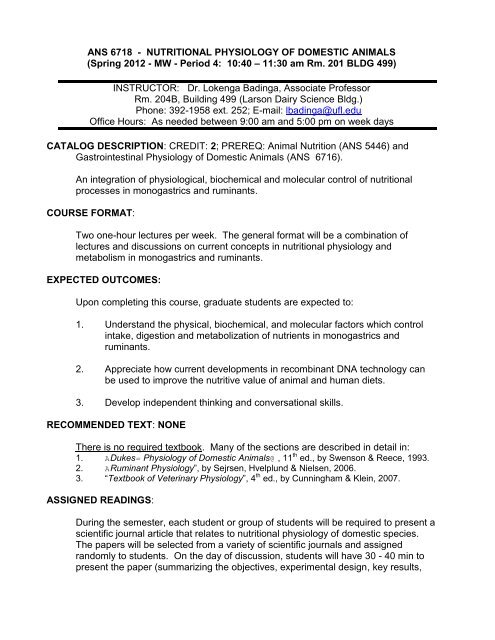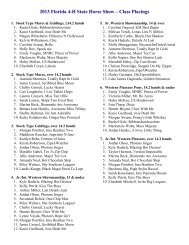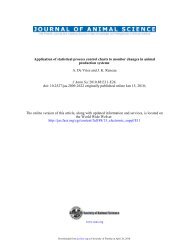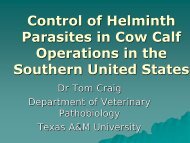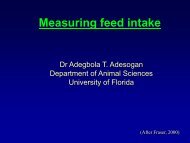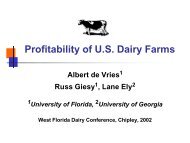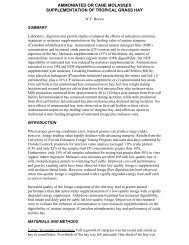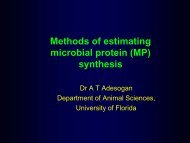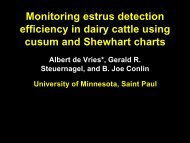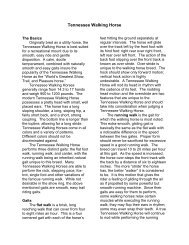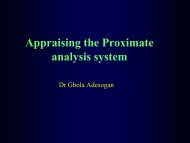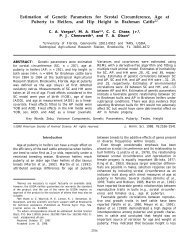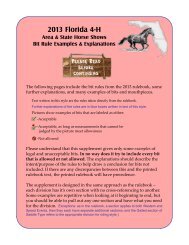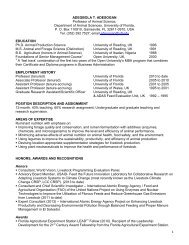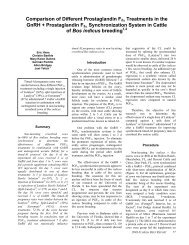ans 6718 nutritional physiology of domestic animals - Department of ...
ans 6718 nutritional physiology of domestic animals - Department of ...
ans 6718 nutritional physiology of domestic animals - Department of ...
Create successful ePaper yourself
Turn your PDF publications into a flip-book with our unique Google optimized e-Paper software.
ANS <strong>6718</strong> - NUTRITIONAL PHYSIOLOGY OF DOMESTIC ANIMALS<br />
(Spring 2012 - MW - Period 4: 10:40 – 11:30 am Rm. 201 BLDG 499)<br />
INSTRUCTOR: Dr. Lokenga Badinga, Associate Pr<strong>of</strong>essor<br />
Rm. 204B, Building 499 (Larson Dairy Science Bldg.)<br />
Phone: 392-1958 ext. 252; E-mail: lbadinga@ufl.edu<br />
Office Hours: As needed between 9:00 am and 5:00 pm on week days<br />
CATALOG DESCRIPTION: CREDIT: 2; PREREQ: Animal Nutrition (ANS 5446) and<br />
Gastrointestinal Physiology <strong>of</strong> Domestic Animals (ANS 6716).<br />
An integration <strong>of</strong> physiological, biochemical and molecular control <strong>of</strong> <strong>nutritional</strong><br />
processes in monogastrics and ruminants.<br />
COURSE FORMAT:<br />
Two one-hour lectures per week. The general format will be a combination <strong>of</strong><br />
lectures and discussions on current concepts in <strong>nutritional</strong> <strong>physiology</strong> and<br />
metabolism in monogastrics and ruminants.<br />
EXPECTED OUTCOMES:<br />
Upon completing this course, graduate students are expected to:<br />
1. Understand the physical, biochemical, and molecular factors which control<br />
intake, digestion and metabolization <strong>of</strong> nutrients in monogastrics and<br />
ruminants.<br />
2. Appreciate how current developments in recombinant DNA technology can<br />
be used to improve the nutritive value <strong>of</strong> animal and human diets.<br />
3. Develop independent thinking and conversational skills.<br />
RECOMMENDED TEXT: NONE<br />
There is no required textbook. Many <strong>of</strong> the sections are described in detail in:<br />
1. ADukes= Physiology <strong>of</strong> Domestic Animals@ , 11 th ed., by Swenson & Reece, 1993.<br />
2. ARuminant Physiology”, by Sejrsen, Hvelplund & Nielsen, 2006.<br />
3. “Textbook <strong>of</strong> Veterinary Physiology”, 4 th ed., by Cunningham & Klein, 2007.<br />
ASSIGNED READINGS:<br />
During the semester, each student or group <strong>of</strong> students will be required to present a<br />
scientific journal article that relates to <strong>nutritional</strong> <strong>physiology</strong> <strong>of</strong> <strong>domestic</strong> species.<br />
The papers will be selected from a variety <strong>of</strong> scientific journals and assigned<br />
randomly to students. On the day <strong>of</strong> discussion, students will have 30 - 40 min to<br />
present the paper (summarizing the objectives, experimental design, key results,
and conclusions). The presiding students will then have about 10 - 20 min to lead<br />
the discussion regarding the appropriateness <strong>of</strong> experimental approaches as well<br />
as the biological significance <strong>of</strong> the work. Other students will be expected to read<br />
the paper in advance and prepare several points for discussion. One day before<br />
the paper discussion, the presenter(s) will be required to turn in a one-page<br />
summary <strong>of</strong> the article and the power point slides which will be presented. These<br />
can be sent to the Instructor via e-mail the day before the paper discussion. The<br />
presentations will be worth 50 points (or 12.5% <strong>of</strong> the final grade). Students are<br />
expected to participate actively in all discussions to receive full credit.<br />
Journal articles for discussion<br />
1. Carnitine palmitoyltr<strong>ans</strong>ferase I in liver <strong>of</strong> periparturient dairy cows: Effects <strong>of</strong><br />
prepartum intake, postpartum induction <strong>of</strong> ketosis, and periparturient disorders<br />
(Dann and Drackley, J Dairy Sci 2005; 88:3851-3859).<br />
2. Hexose tr<strong>ans</strong>porter expression and function in mouse small intestine: Role <strong>of</strong><br />
diurnal rhythm (Fatima et al, J Gastrointest Surg 2009; 13:634-641).<br />
3. Milk performance and glucose metabolism in dairy cows fed rumen-protected fat<br />
during mid lactation (Lohrenz et al, J. Dairy Sci 2010; 93:5867-5876).<br />
4. Gluconeogenesis in dairy cows: The secret <strong>of</strong> making sweet milk from sour dough.<br />
(Aschenbach et al, Life 2010; 62:869-877).<br />
5. Glucose tr<strong>ans</strong>porters and enzymes related to glucose synthesis in small intestinal<br />
mucosa <strong>of</strong> mid-lactation dairy cows fed 2 levels <strong>of</strong> starch (Lorenz et al, J Dairy Sci<br />
2011; 94:4546-4555).<br />
6. Involvement <strong>of</strong> skeletal muscle protein, glycogen, and fat metabolism in the<br />
adaptation <strong>of</strong> early lactation <strong>of</strong> dairy cows (Kuhla et al, J Proteome Res 2011;<br />
10:4252-4262).<br />
GRADES:<br />
The final grade will be based on performance in all areas <strong>of</strong> the course as follows:<br />
Hourly exams 2 @ 100 pts = 200 pts (50.0%)<br />
Final exam 1 @ 150 pts = 150 pts (37.5%)<br />
Paper discussion 1 @ 50 pts = 50 pts (12.5%)<br />
Grading scale:<br />
A = 95-100%; A - = 90-94%; B + = 86-89%; B = 80-85%; B - = 76-79%; C + = 70-75; C = 66-<br />
69%; C - = 60-65%; D + = 56-59%; D = 50-55%; D - = 46-49%; E =
Make-up Exam Policy:<br />
No make-up examinations will be administered. For university functions or excused<br />
absences, arrangements can be made to double the grade <strong>of</strong> the subsequent<br />
examination. Verification <strong>of</strong> illness in the form <strong>of</strong> a note from the physician or form<br />
for athletic activity or university-sponsored events will be required a week prior to<br />
the scheduled exam. Detailed information on excused absences can be found on<br />
the following link:<br />
http://www.registrar.ufl.edu/catalog/policies/regulationattendance.html#absences<br />
ACADEMIC HONESTY, SOFTWARE USE, UF COUNSELING SERVICES, SERVICES<br />
FOR STUDENTS WITH DISABILITIES<br />
Academic Honesty:<br />
In 1995 the UF student body enacted a new honor code and voluntarily committed<br />
itself to the highest standards <strong>of</strong> honesty. When students enroll at the university,<br />
they commit themselves to the standard drafted and enacted by students. In<br />
adopting this honor code, the students <strong>of</strong> the University <strong>of</strong> Florida recognize that<br />
academic honesty and integrity are fundamental values <strong>of</strong> the university community.<br />
Students who enroll at the university commit to holding themselves and their peers<br />
to the high standard <strong>of</strong> honor required by the honor code. Any individual who<br />
becomes aware <strong>of</strong> a violation <strong>of</strong> the honor code is bound by honor to take corrective<br />
action. The quality <strong>of</strong> a University <strong>of</strong> Florida education is dependent upon<br />
community acceptance and enforcement <strong>of</strong> the honor code.<br />
The honor code: “We, the members <strong>of</strong> the University <strong>of</strong> Florida community, pledge<br />
to hold ourselves and our peers to the highest standards <strong>of</strong> honesty and integrity.”<br />
On all work submitted for credit by students at the university, the following pledge is<br />
either required or implied: “On my honor, I have neither given nor received<br />
unauthorized aid in doing this assignment.”<br />
The university requires all members <strong>of</strong> its community to be honest in all endeavors.<br />
A fundamental principle is that the whole process <strong>of</strong> learning and pursuit <strong>of</strong><br />
knowledge is diminished by cheating, plagiarism and other acts <strong>of</strong> academic<br />
dishonesty. In addition, every dishonest act in the academic environment affects<br />
other students adversely, from the skewing <strong>of</strong> the grading curve to giving unfair<br />
advantage for honors or for pr<strong>of</strong>essional or graduate school admission. Therefore,<br />
the university will take severe action against dishonest students. Similarly,<br />
measures will be taken against faculty, staff and administrators who practice<br />
dishonest or demeaning behavior.<br />
Students should report any condition that facilitates dishonesty to the instructor,<br />
department chair, college dean or student Honor Court.
It is assumed all work will be completed independently unless the assignment is<br />
defined as a group project, in writing by the instructor.<br />
This policy will be vigorously upheld at all times in this course.<br />
S<strong>of</strong>tware Use:<br />
All faculty, staff and students <strong>of</strong> the university are required and expected to obey the<br />
laws and legal agreements governing s<strong>of</strong>tware use. Failure to do so can lead to<br />
monetary damages and/or criminal penalties for the individual violater. Because<br />
such violations are also against University policies and rules, disciplinary action will<br />
be taken as appropriate.<br />
Campus Helping resources:<br />
Students experiencing crises or personal problems that interfere with their general<br />
well-being are encouraged to utilize the university’s counseling resources. Both the<br />
Counseling Center and Student Mental Health Services provide confidential<br />
counseling services at no cost for currently enrolled students. Resources are<br />
available on campus for students having personal problems or lacking clear career<br />
or academic goals, which interfere with their academic performance. The<br />
Counseling Center is located at 301 Peabody Hall (next to Criser Hall). Student<br />
Mental Health Services is located on the second floor <strong>of</strong> the Student Health Care<br />
center in the infirmary.<br />
1. University Counseling Center, 301 Peabody Hall, 392-1575,<br />
www.counsel.ufl.edu<br />
2. Career Resource center, CR-100 JWRU, 392-1602, www.crc.ufl.edu/<br />
3. Student Mental Health Services, Rm. 245 Student Health Care Center, 392-<br />
1171, www.shcc.ufl.edu/smhs/<br />
Alcohol and Substance Abuse Program (ASAP)<br />
Center for Sexual Assault / Abuse recovery & Education (CARE)<br />
Eating Disorders Program<br />
Employee Assistance Program<br />
Suicide Prevention Program<br />
Students with disabilities:<br />
The Disability Resource Center coordinates the needed accommodations <strong>of</strong> students with<br />
disabilities. This includes the registering disabilities, recommending academic<br />
accommodations within the classroom, accessing special adaptive computer equipment,<br />
providing interpretation services, and mediating faculty-student disability related issues.<br />
0001 Reid Hall, 392-8565, www.dso.ufl.edu/drc/
TOPIC OUTLINE<br />
_____________________________________________________________________<br />
Date<br />
Topic<br />
_____________________________________________________________________<br />
Week 1<br />
Jan 09/12 General organization and Class Objectives<br />
Jan 11/12 Physical and metabolic regulation <strong>of</strong> feed intake<br />
Jan 16/12<br />
Jan 18/12<br />
Jan 23/12<br />
Jan 25/12<br />
Week 2<br />
Martin Luther King Day (No Classes)<br />
Carbohydrate digestion and absorption<br />
Week 3<br />
Carbohydrate digestion and absorption<br />
Carbohydrate metabolism<br />
Week 4<br />
Jan 30/12 Carbohydrate metabolism<br />
Feb 01/12 Journal article discussion (1)<br />
Feb 06/12<br />
Feb 08/12<br />
Feb 13/12<br />
Feb 15/12<br />
Week 5<br />
Exam I<br />
Ruminant Nutrition Symposium<br />
Week 6<br />
Lipid digestion and absorption<br />
Lipid digestion and absorption<br />
Feb 20/12<br />
Feb 22/12<br />
Lipid metabolism<br />
Lipid metabolism<br />
Week 7<br />
Feb 27/12<br />
Feb 29/12<br />
March 05/07<br />
Mar 12/12<br />
Mar 14/12<br />
Week 8<br />
Protein digestion and absorption<br />
Protein digestion and absorption<br />
Week 9<br />
SPRING BREAK (NO CLASSES)<br />
Week 10<br />
Amino acid metabolism<br />
Amino acid metabolism<br />
Week 11<br />
Mar 19/12 Journal article discussion (2)<br />
Mar 21/12 Exam II
Mar 26/12<br />
Mar 28/12<br />
Apr 02/12<br />
Apr 04/12<br />
Apr 09/12<br />
Apr 11/12<br />
Week 12<br />
Metabolic adjustments to lactogenesis<br />
Disorders <strong>of</strong> carbohydrate and fat metabolism<br />
Week 13<br />
Dietary regulation <strong>of</strong> gene expression<br />
Dietary regulation <strong>of</strong> gene expression<br />
Week 14<br />
Disorders <strong>of</strong> carbohydrate and fat metabolism<br />
Dietary regulation <strong>of</strong> gene expression<br />
Apr 16/12<br />
Apr 18/12<br />
Week 15<br />
Dietary regulation <strong>of</strong> gene expression<br />
Biotechnology application in nutrition<br />
Week 16<br />
Apr 23/12 Journal article discussion (3)<br />
Apr 25/12 Course wrap-up<br />
May 2/12<br />
Final Exam (Objectives 5 – 8; Room 201 - 12:30 pm - 2:30 pm)


